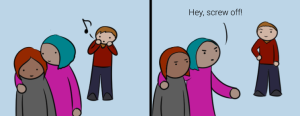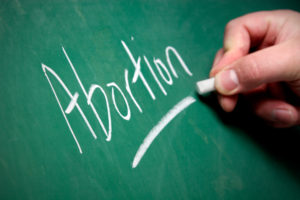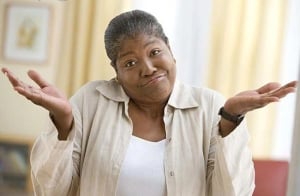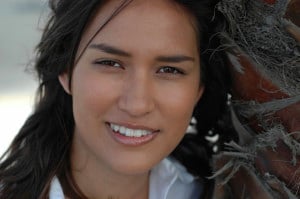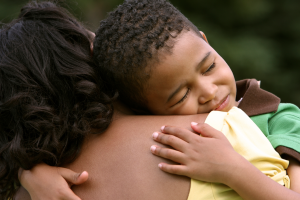
Source: The Momentum of Failure
Originally published on The Huffington Post and cross-posted here with their permission.
The reality of male privilege is well established.
Women struggle to get into positions of power within business or politics. Women make 5- to 7-percent less than similarly situated men, even when all other variables are accounted for, leaving discrimination as the primary culprit. The epidemic of sexual assault in the military is longstanding, getting worse, and a national shame.
There is no question that being female carries a significant “life penalty” with it. There’s no denying that male privilege exists.
However, sometimes it feels taboo to ask how far male privilege goes.
Who better to ask about it, though, than trans men and women who have lived on both sides of the divide?
Recently, I came across a blog post by a trans man of color who asked whether trans men really have it easier. It explored the intersectionality of gender and race in his experience.
He concluded that being seen by society as a black man carried more disadvantages than being seen as a black woman, thanks to the prevalence of profiling. When I shared this blog post with other trans people, the responses were mixed.
A white trans man friend who read this blog post observed:
I’m hesitant to say that either side of the spectrum has it easier than the other, because a struggle is a struggle. But 99% of the time, trans men definitely do have it easier.
A trans woman of color who is also a veteran observed that the intersection of being a person of color and a trans woman is even worse:
I was stopped for looking like a drug dealer by the local police. It didn’t help when the local addicts would walk up to me and ask for their stuff. However, I haven’t read a single story when a trans woman of color was attacked and lived.
I’ve slowly accepted the fact that my chances of surviving in Afghanistan were higher than my chances being out in America. Once I transition, life expectancy goes out the window.
Her observations are in line with the statistics we have. According to the National Coalition of Anti-Violence Programs, 45% of all LGBT people murdered in hate crimes are trans women (despite being only about 6% of the LGBT community).
Of those transgender persons murdered, 87% are trans women of color.
My friend was even right about the level of violence: Trans people who survive hate crimes are 1.76 times more likely to require significant medical attention than other LGB victims.
Economically, transgender people are twice as likely to be unemployed and four times as likely to live on less than $10,000 per year.
As a result, when you are perceived by others as a male-assigned-at-birth (MAAB) transgender person, you more than forfeit whatever privilege you had in terms of susceptibility to violence and poverty.
My own personal experiences also suggest that male privilege is not a constant value, but can vary depending on where you are.
I was often at a huge disadvantage as a small, slightly built, somewhat effeminate “man” in a very type-A, masculine military culture. In most situations, the male way of showing who’s boss is to see who gets the omega to roll over fastest.
Being the automatic omega dog in any given situation means either taking the abuse or standing up to it. Standing up to it generally meant taking even worse abuse as a result.
As a civilian researcher, I still work within a somewhat military environment, with pilots. The pilots are uniformly polite, proper in their bearing, and professional in their approach to the work we are doing.
They also tend to pay more attention to the adjustable briefing room chairs they sit in than to me or any of the other women I work with. There is often more than a whiff of patronization when my military past comes up.
From my white-collar perspective, given the choice between active abuse and being treated like a wall-hanging in a hotel room, the option of being ignored actually seems preferable. I somehow doubt, though, that I would feel better off post-transition if I had been the one on the top of the heap physically and socially pre-transition.
Environment is a variable as well. I went to high school with a very tight-knit, gifted group of people that was diverse and egalitarian. If you looked at our résumés today, you would be very hard-pressed to tell which ones belong to women and which ones belong to men.
A cisgender, straight (and very funny) feminist friend had her own thoughts on all of this:
Many feminists would respond by saying, “That’s patriarchy.” The system of male privilege winds up harming men. The pressure to exert domination, particularly physical domination, over other men is a result of patriarchy’s strict gender roles.
Similarly, the horrible treatment of trans or gender nonconforming people who were designated male at birth could actually be seen as a manifestation of patriarchy/misogyny.
They are hated for their rejection of male privilege, their embracing of femininity. It’s almost as if the only thing worse than being a woman is “choosing” to be a woman when you don’t have to.
Another queer feminist writer sums the concept up well:
Really, everyone is affected by patriarchy. And, patriarchy looks different, takes different forms, and has different effects in different places, times, classes, religions, and races.
***
Male privilege undeniably exists. However, it does not seem to be the monolithic power some might assume. It isn’t the be-all and end-all of the male experience, and it also has a flip side that harms some men even as it privileges them as a class.
It varies based on race, work environment, cultural setting, and whether someone is perceived as gender-conforming. Pinning down how much it is actually worth depends on many factors and interactions besides simply sex.
[do_widget id=”text-101″]
Brynn Tannehill is originally from Phoenix, Ariz. She graduated from the Naval Academy with a B.S. in computer science in 1997. She earned her Naval Aviator wings in 1999 and flew SH-60B helicopters and P-3C maritime patrol aircraft during three deployments between 2000 and 2004. She served as a campaign analyst while deployed overseas to 5th Fleet Headquarters in Bahrain from 2005 to 2006. In 2008 Brynn earned a M.S. in Operations Research from the Air Force Institute of Technology and transferred from active duty to the Naval Reserves. In 2008 Brynn began working as a senior defense research scientist in private industry. She left the drilling reserves and began transition in 2010. Since then she has written for OutServe magazine, The New Civil Rights Movement, and Queer Mental Health as a blogger and featured columnist. Brynn and her wife Janis currently live in Xenia, Ohio, with their three children. Follow her on Twitter @BrynnTannehill.
Search our 3000+ articles!
Read our articles about:
Our online racial justice training
Used by hundreds of universities, non-profits, and businesses.
Click to learn more





